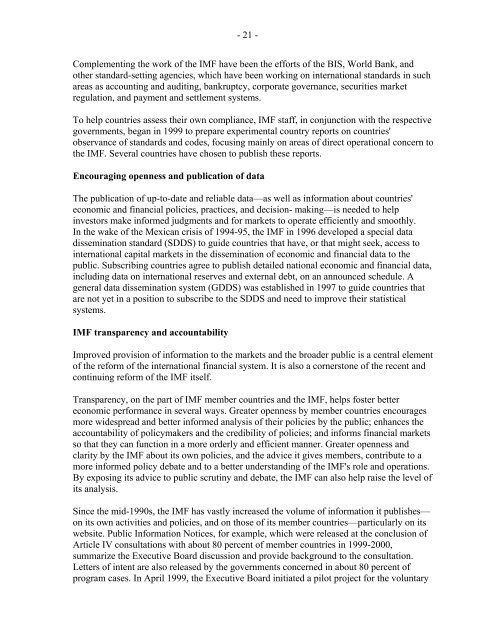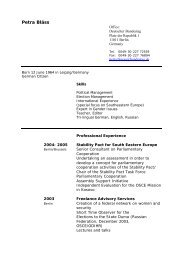What Is the International Monetary Fund? - the JVI eCampus!
What Is the International Monetary Fund? - the JVI eCampus!
What Is the International Monetary Fund? - the JVI eCampus!
You also want an ePaper? Increase the reach of your titles
YUMPU automatically turns print PDFs into web optimized ePapers that Google loves.
- 21 -<br />
Complementing <strong>the</strong> work of <strong>the</strong> IMF have been <strong>the</strong> efforts of <strong>the</strong> BIS, World Bank, and<br />
o<strong>the</strong>r standard-setting agencies, which have been working on international standards in such<br />
areas as accounting and auditing, bankruptcy, corporate governance, securities market<br />
regulation, and payment and settlement systems.<br />
To help countries assess <strong>the</strong>ir own compliance, IMF staff, in conjunction with <strong>the</strong> respective<br />
governments, began in 1999 to prepare experimental country reports on countries'<br />
observance of standards and codes, focusing mainly on areas of direct operational concern to<br />
<strong>the</strong> IMF. Several countries have chosen to publish <strong>the</strong>se reports.<br />
Encouraging openness and publication of data<br />
The publication of up-to-date and reliable data—as well as information about countries'<br />
economic and financial policies, practices, and decision- making—is needed to help<br />
investors make informed judgments and for markets to operate efficiently and smoothly.<br />
In <strong>the</strong> wake of <strong>the</strong> Mexican crisis of 1994-95, <strong>the</strong> IMF in 1996 developed a special data<br />
dissemination standard (SDDS) to guide countries that have, or that might seek, access to<br />
international capital markets in <strong>the</strong> dissemination of economic and financial data to <strong>the</strong><br />
public. Subscribing countries agree to publish detailed national economic and financial data,<br />
including data on international reserves and external debt, on an announced schedule. A<br />
general data dissemination system (GDDS) was established in 1997 to guide countries that<br />
are not yet in a position to subscribe to <strong>the</strong> SDDS and need to improve <strong>the</strong>ir statistical<br />
systems.<br />
IMF transparency and accountability<br />
Improved provision of information to <strong>the</strong> markets and <strong>the</strong> broader public is a central element<br />
of <strong>the</strong> reform of <strong>the</strong> international financial system. It is also a cornerstone of <strong>the</strong> recent and<br />
continuing reform of <strong>the</strong> IMF itself.<br />
Transparency, on <strong>the</strong> part of IMF member countries and <strong>the</strong> IMF, helps foster better<br />
economic performance in several ways. Greater openness by member countries encourages<br />
more widespread and better informed analysis of <strong>the</strong>ir policies by <strong>the</strong> public; enhances <strong>the</strong><br />
accountability of policymakers and <strong>the</strong> credibility of policies; and informs financial markets<br />
so that <strong>the</strong>y can function in a more orderly and efficient manner. Greater openness and<br />
clarity by <strong>the</strong> IMF about its own policies, and <strong>the</strong> advice it gives members, contribute to a<br />
more informed policy debate and to a better understanding of <strong>the</strong> IMF's role and operations.<br />
By exposing its advice to public scrutiny and debate, <strong>the</strong> IMF can also help raise <strong>the</strong> level of<br />
its analysis.<br />
Since <strong>the</strong> mid-1990s, <strong>the</strong> IMF has vastly increased <strong>the</strong> volume of information it publishes—<br />
on its own activities and policies, and on those of its member countries—particularly on its<br />
website. Public Information Notices, for example, which were released at <strong>the</strong> conclusion of<br />
Article IV consultations with about 80 percent of member countries in 1999-2000,<br />
summarize <strong>the</strong> Executive Board discussion and provide background to <strong>the</strong> consultation.<br />
Letters of intent are also released by <strong>the</strong> governments concerned in about 80 percent of<br />
program cases. In April 1999, <strong>the</strong> Executive Board initiated a pilot project for <strong>the</strong> voluntary



